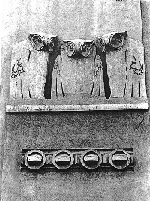I am a professor in the department, a member of the Program
in Comparative Literature and of the Center for Women's and
Gender Studies, also affiliated with the Center for European Studies, the Center for
Russian and Eastern European Studies, and the Program for Science, Technology, and Society.
I have been at UT since 1980, and have
spent a lot of my time developing interdisciplinary courses and
research, particularly those bringing literary theory
and the disciplines together. My major concentration is probably best described as
intellectual history (Geistesgeschichte), and so my work
runs on both sides of a line separating traditional
literary-historical studies (Enlightenment through Impressionism,
and Austria through the twentieth century) and more theoretical and philosophical work (German
Idealism, philosophy of language, literary and cultural theory, Lacanian theory and identity
politics, WGS theory,
and the like). This combination of theory and cultural studies has
also led me to do work on reading theory and applied linguistics
as well -- I want to see new ways that culture, identity, and the politics of
cultural identity can be researched
and taught. My publications thus span categories (for
details, click below). The list of courses I have taught are on
topics that range from contemporary theory, feminism, Freud, and Lacan back to Kant and
Hegel, and particularly graduate theory core courses for all three of my departments
(for titles and class materials,
click on "Courses Taught").
WORK IN PROGRESS
Janet Swaffar and I have a book just appeared at the MLA:
Remapping the Foreign Language Curriculum: A Multi-Literacies Approach (October 2005).
This text takes literary and learning theory together to suggest how
literature, culture, and language might more profitably be taught to undergraduates.
I am following up with a second book-length study
of the relationship between theory and institutional frameworks of teaching and scholarship,
this time as relevant to the graduate curriculum (and, to varying degrees, to the undergraduate major
curriculum). Based around the notion of a "cognitive apprenticeship," I argue and exemplify
how the canon wars have led to an almost complete abandonment of the position of literary studies
as systematic architectures of knowledge production and evaluation -- a tacit shift towards an
almost exclusively ethically based curricular practice that priveges immmanence and voice, and hence
particular interpretive communities and/or performance practices,
where the older canons privileged hegemonic and often
disembodied discourses.
With Carlos Amador, I have just completed a book-length manuscript
tentatively entitled Decanting Kant: The Cultural Politiics of the Theory Wars.
It works out an alternate geneaology for the twentieth century "theory wars" in a
genesis out of the institutional and cultural politics of the nineteenth century. It offers
a new optic as to what is at stake in the current disciplinary
fractures and shifts, a new archaeology of knowledge that calls into question the
self-definitions of today's purportedly alterior, anti-hegemonic strategies
for knowledge and community identity production.
I am wrapping up a monograph project on performances in the Austro-Hungarian and Austrian public
spheres since 1760-- with "performances" meaning not only stagings, but also performances of
identity spaces pecular to the blended cultural space that today is dismissed as "Central
Europe." Tentatively entitled The Persistence of Kasperl in Memory, this set of case
studies provide evidence for the existence of a very different kind of public sphere in
Vienna and the Empire's cities than is accommodated in the too-simple vision of
Dialectic of the Enlightenment and the Frankfurt-School or systems-theory-inspired view
in play in German studies. This Austro-Hungarian and Austrian public sphere is a decidedly
nationalist state which does not, however, accept its identity as a mono-culture, as most of today's
theory would assume.
On the side, I am trying to publish a wonderful bagatelle from the history
of women's literature in the germanophone world: Mayerling: The Woman's View, a
translation and commentary of a memoir written by the mother of
Mary Vetsera, who died with Austro-Hungary's Crown Prince
Rudolph in 1889. It's the Victorian memoir we've been missing in German literature
for a long time!
For details on what else I've done, including the dissertations I've supervised,
check out Arens' CV.
Messages to: k.arens@mail.utexas.edu


